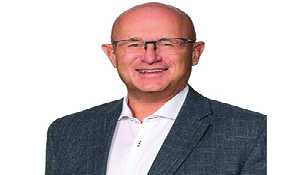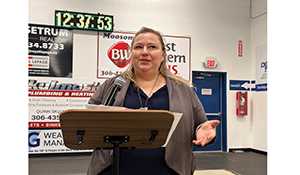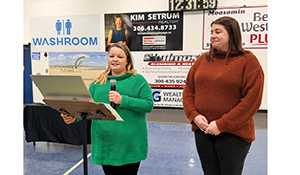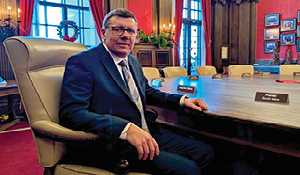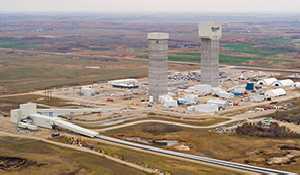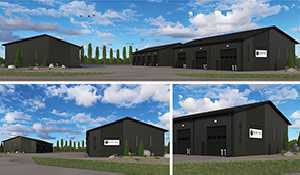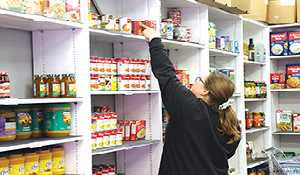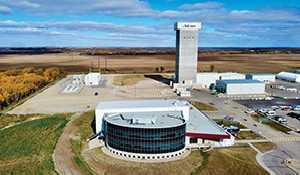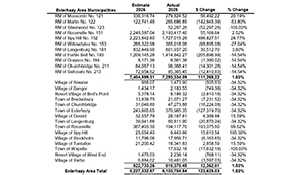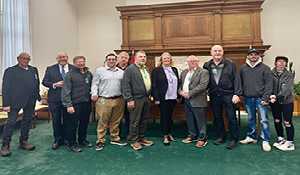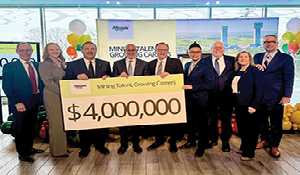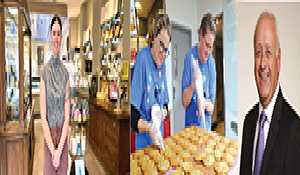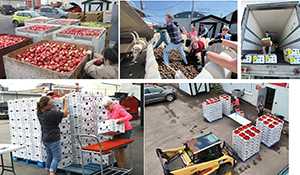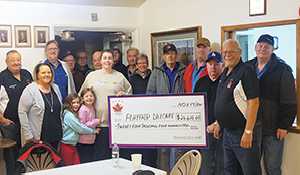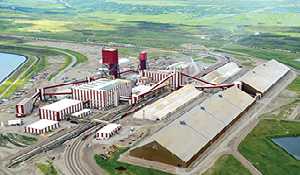‘Nobody is going to be Brad Wall’
December 9, 2017, 9:51 am
Kevin Weedmark
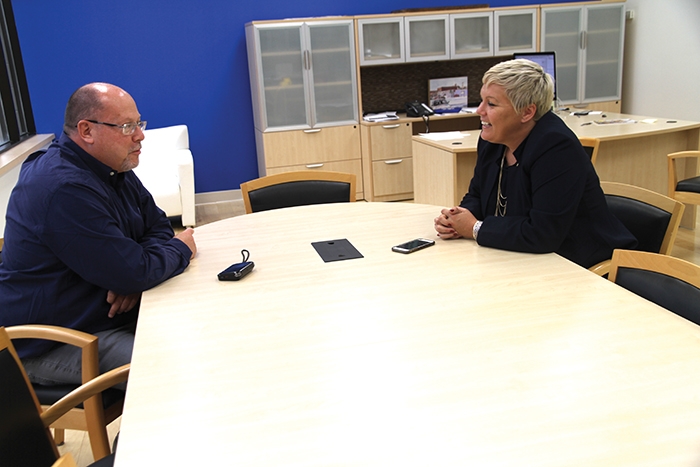

Beaudry-Mellor says next premier will have a hard time filling premier’s shoes
Tina Beaudry-Mellor is one of the candidates for leadership of the Sask Party. The party will select its next leader—and Saskatchewan’s next premier—in January. Beaudry-Mellor travelled to Moosomin on Thursday and sat down with World-Spectator editor Kevin Weedmark for an interview.
You are not as well known as some of the candidates. Can you tell us a little bit about yourself?
My mother worked for the RCMP for many, many years. My father was a tradesman in the construction business and so we moved a lot when I was a young child, landing in Regina when I was in grade four. My dad’s idea of daddy-daughter day was cleaning job sites, so I come from that kind of background. My grandfather was a beer salesman for Molsons. His partner was George Reed when he retired from football. So I had working class roots. I did have a small consulting business. I did quite a bit of work for the government on the surgical wait times initiative, trying to streamline that to get our wait times down. Also on the immigrant nominee program back about five or six years ago when we were having a really hard time getting truckers for a lot of our trucking businesses, and so the processes there were just so onerous—employers could not get them. I have also been a political scientist at the U of R forever, and probably the only moderate political scientist at the U of R. I chaired the last Sask Party convention and MC’d the last premier’s dinner before last. I am largely urban, but I spent my summers picking rocks like many kids.
You are a fairly new MLA. What made you take that leap into electoral politics?
Back in 2006-07, when I was teaching, I was writing all kinds of reference letters for my best and brightest students to go somewhere else.
One of the things that the Sask Party was really committed to was keeping young people in the province and that attracted me.
I also started bringing students to the legislature for budget day and for the speech from the throne and I was continuously surprised in the social investments. I was surprised when we were announcing things like investments in families who had kids with autism and those sorts of things—they weren’t heartless. Those two things made me start to think this party is really onto something, and so I decided to run eventually because you get to a point in your career where you really want to get more people engaged and interested in politics, and you can only do that so much from the so-called ivory towers. So you need to get out, and that was the reason I ran. And there was a new constituency that was developed as the result of the boundary redraws, and so I decided to run. It was the party for me because it is a balance between fiscal conservatism, but also those policies that have heart and interest in young people, which is a particular area of passion for me.
As a relatively new MLA, why did you decide to run for leadership?
A couple of reasons. One, I think it is important to me that we see women in leadership roles. It is not a quota thing; I am not a fan of quotas. But if we do want to see women run, we should probably step up. Second thing, I think I have some value to add to this conversation. I think it is important for our party. We have always been a big tent party and I would like to see that continue. We have just lost two by-elections in a row, losing fairly substantially in the last one. I don’t want to see that trend continue. I think I can bring a lot of young people into our party if we are talking renewal. I think engaging young people and people who maybe never had a party membership before. I want to do those two things—broaden the conversation to make sure we have that balance we have always had, and secondly to bring some new people into the party, and we have some energy in this race. That is my value add. Even if I am not successful at the end of this, if I do those things our party will be better for it and that is my aim.
Brad Wall has been a very popular premier in rural Saskatchewan, and for many he is synonymous with the Sask Party. What does the next leader of the Sask Party have to do to maintain that popularity?
First of all it is important to note that nobody is going to be Brad Wall. I have been watching politics for a very long time and people like that are rare. He is a very rare, extraordinary communicator, very relatable with the public. He has been an extremely strong advocate not just on the Saskatchewan stage but the Canada and world stage on a number of issues.
The next leader is going to have to do that still. We definitely still need to have a voice in terms of the carbon tax, on the proposed federal tax changes on small businesses, which is very, very dangerous for many people—it is a concern for many.
I think those things will have to continue and I think you will find that all Sask Party candidates are on the same page. We are also all of the same page economically—there will be very little variation between us. We all believe that the economy is what allows us to invest in the quality of life for people.
The next leader is going to have to think outside the box and try to bring new people into the party. The face of Saskatchewan is changing. There is a combination of continuing the things the premier had done and done really well, and still having enough energy to have a refresh for the party and look at the next 10 years by bringing another generation into the Saskatchewan party.
What are the qualities that the next Sask Party Leader needs to have?
Be relatable, be able to listen to people across the province and be able to be responsive to that. One of the things I have always admired about the premier is that he is humble and he is capable of admitting a mistake and saying ‘okay we made a mistake on this and we have heard the people and we need to do something about that,’ and he has done that on numerous occasions.
I think some people criticize that but I think it is the mark of the humble leader, which he is pretty extraordinary at.
Having a hand on the economy is also very important, but the premier has also had a heart. I have seen him on the disability piece—it is very near and dear to him.
What are the biggest issues the next premier is going to have to tackle?
The carbon tax, proposed small tax changes by the federal government, I’m hearing a lot about that on farms. It is tough to exit farming as it is, but the succession planning piece that will be impacted by the federal tax changes is pretty significant.
The same is true for multi-generational family businesses. In my city there are a lot of Greek families who own restaurants and everybody (in the family) works in the restaurant, and so they will be impacted by this.
We are going to have to deal with the GTH. It has been a trust issue and we still hear about it on the doorstep. The RCMP investigation is happening right now. I would like to see a public inquiry following the investigation. I think there are enough questions in the public that we need to shed a light on them in order to turn the page and start fresh. Trust is very important in politics. I think that if we have some openness about that issue and have a public inquiry about that issue, I think that is an important step for us as a party to restore some trust and that brand of trust that the Sask Party has always had.
Agricultural issues will always be important as well as trade issues, so the NAFTA piece and some of the discussions Trump has been having around NAFTA.
I think Saskatchewan is positioned to be a western economic powerhouse. We have the election of the Green/NDP party in B.C. We have the NDP party in Alberta, and in Manitoba, well I have many friends in that government and I don’t get a strong sense of a vision there. Saskatchewan is well positioned to be a real economic powerhouse if we leverage that forward. The premier has done an excellent job of creating networks in Washington so much that he could get into places that the federal government could not get into in the last negotiation. That is going to be an issue because we are a trading partner.
I would say that we need to do something in the urbans because we just can’t continue to lose seats in urban environments so we are going to have to speak to some of the urban issues as well as rural.
Why did you decide the PST decision needs to be revisited?
I have been hearing about it tons. Following the budget in March I heard quite a bit about it from insurance brokers and individual policy holders.
One of the things that I didn’t truly realize until I got out onto the campaign trail and spent some time out on farms in Saskatchewan, I didn’t realize the extent to which farmers are consumers of insurance products. And when you begin to have those conversations you realize that they have multiple vehicles, crop, hail, life, disability, the list could go on. When you are looking at all of those together, some are estimating it is a $30,000 hit. That to me says a couple things. One, at this time with plummeting resource prices we really shouldn’t be saddling our agricultural sector with an additional tax burden when they are shouldering our province’s economic growth, that is the first thing. The second thing is, as the former Minister of Social Services I can tell you that I’m morally opposed to penalizing people for doing the right thing and trying to prevent their families from falling into hardship, and those things brought me to that decision.
What kind of response are you getting to that announcement?
Very favorable. People are really pleased to see it. We released a video today. I think our aim in that video was to explain it to people that may not understand why it is such a big issue. I am hearing some very positive feedback. You might have seen there was also an Insightrix poll that was done that shows about 78 percent of people in Saskatchewan are opposed to (the expanded PST), and so people are quite excited about that, at least that they feel like they are being heard on the issue and that is the most important thing.
What sort of things are you hearing now that you are out and about with people?
Definitely the GTH issue is on people’s minds. There are some concerns about education.
I am definitely hearing concerns from producers about their ability to access American markets with NAFTA with President Trump, and I’m hearing some concerns about health care, although not as much.
There are some concerns in rural Saskatchewan about the amalgamation of the health regions, although many would say they are not unhappy to see the bureaucracy go, the CEO’s of all those health regions go. They are just worried about having a voice in terms of those things.
Economic growth is the number one thing for people, and people want to make sure we continue to fight the carbon tax, and definitely the number one issue on people’s minds right now is the federal tax changes.
Does the provincial government have a role in trying to directly foster economic development?
Absolutely. Let me give you a couple of examples. This is something the premier has started and I think it is really important. We can either create a climate that is positive for investment or not through a number of things we do. One way we can do that is we have been lobbying for several years to have direct flights out of Regina so we can get head offices here and attract head offices to Saskatchewan and create head office jobs here. That is a very important role the government can play. I think we need to get out of the way on a number of things but there are places we can advocate and that is certainly one. The NAFTA piece, the carbon tax is another one. Government should not be competing with private business when ever possible, but we can advocate to create a climate that is positive for investment, and we should be.
How has your campaign been going so far?
We are trying to run a bit of a different campaign than some of the other campaigns. I’m not going to disparage any of my colleagues because I am really pleased, actually. I think we have great candidates across the board and that is good for us. We are all slightly different, which means we are all speaking to slightly different groups, which is good for our party. We’re running a slightly different campaign.
We’re trying to be a little bit more grassroots with our approach. Definitely we are a small organic kind of team going on and having a lot of one-on-one conversations with people. We are trying deliberately to go to new people and not the same sort of people that we have historically gone to. I think that is different. I am starting to feel that is getting some traction. I think all the campaigns are going well.
What I can tell you is that I think the Sask Party has a new energy right now. And while I was extremely sad when the premier announced he was leaving, as this campaign has gone on, I realized it was brilliant in terms of just being able to re-energize and get us back out to the people following a really difficult budget that had a lot of people angry or demoralized.
This leadership race has done a lot to get us out into communities, which is really important, talking to people and hearing from them and trying to regroup and I think it was brilliant in terms of that perspective. I think all of the campaigns are doing well in that sense.
How will you determine the success of your campaign? Is it simply if you are the next premier, that’s success, and anything else is failure, or are there other goals?
My value add in this process is I want to run a slightly different campaign than everybody else.
I want to bring in some new people. I want to engage the youth.
I want to bring some people back that may have left us. I want to keep the policy debate broad enough so that we can make sure that we don’t lose any more of our urban seats and that our party remains a big tent.
If I can do all those things at the end of this, then I have added value to our party and that is the most important thing. Even if I am not successful in the leadership I’m going to feel very, very good about this campaign.

